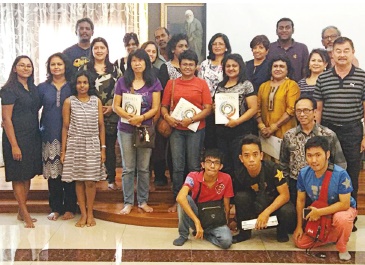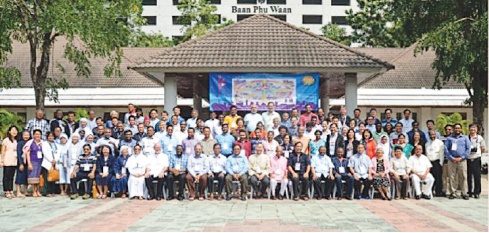There were 118 participants — bishops, priests, religious and laity from 15 countries who came together for the VII Asian Integral Pastoral Approach (AsIPA) General Assembly which took place at Baan Phu Waan Pastoral Centre in the Archdiocese of Bangkok in Thailand from October 22 to 28, 2015.
The topic of BECs living with people of different faiths and beliefs is well chosen and it is well worded. The focus is living with people who are of other religious traditions. It is our relationship to people of other religions.
This is an excellent topic at this time because the last day of this assembly was October 28. That day will be the 50th anniversary of the Declaration on the Relation of the Church to Non-Christian Religions (Nostra Aetate, NA). October 28, 1965 this declaration was proclaimed by Pope Paul VI. It is this declaration that launched the Church in a new way into seeking out relationships with people of other religions. “The Church, therefore, exhorts her sons, that through dialogue and collaboration with the followers of other religions, carried out with prudence and love and in witness to the Christian faith and life, they recognise, preserve and promote the good things, spiritual and moral, as well as the socio-cultural values found among these men.” (NA, 2) Our exploration of BECs living with people of different faiths and beliefs is a type of celebration of this anniversary.
To explore the understanding of interreligious dialogue will help us to better understand how we can be open to respect, understand and learn from these people of different faiths and beliefs who are our neighbours and how we can bear Christian witness to these people. These are two sides of the same coin. Pope Francis has said in his 2013 Post-Synodal Apostolic Exhortation The Joy of the Gospel (Evangelii Gaudium, EG): “In this dialogue, ever friendly and sincere, attention must always be paid to the essential bond between dialogue and proclamation, which leads the Church to maintain and intensify her relationship with non-Christians…. Evangelisation and interreligious dialogue, far from being opposed, mutually support and nourish one another.” (EG, 251)
Not New
This topic of interreligious dialogue and BECs is not new. In Hong Kong in 1977, the somewhat newly formed FABC organised an Asian Colloquium on Ministries in the Church. This colloquium acknowledged the many already existing Basic Christian Communities or what we call BECs. It encouraged the development of these BECs, and it recognised the need for lay leadership roles in these Basic Christian Communities. One of the mentioned possible lay ministries in the Church would be a ministry of interreligious dialogue. BECs, and there was already reflection on lay ministry that included interreligious dialogue as to “promote understanding and appreciation between living faiths of the world and, together with the members of those other religious traditions, foster concerns for men and society as these spring from a faith commitment.’”
The First Assembly of the FABC in 1974 was an effort to ground the work of mission in the local context of each of the peoples of Asia and this concretely means a continuous and humble dialogue with cultures, religions and the poor. This “triple dialogue” with cultures, religions and the poor from the first assembly in 1974 has been seen as an articulation of the heart of the FABC through all the years. The Asian Bishops envision dialogue as our way of being Church. This goes back to the beginning, the first assembly of 1974.
FABC and the Ecclesiology of Communion
The efforts of the FABC to understand the Ecclesiology of communion from an Asian script has been greatly beneficial. Its constant thrust in forming BECs have resulted in many local churches in Asia taking steps to promote them.
In the final statement of the fifth plenary assembly of the FABC in Bandung, Indonesia in 1990, in paragraph 8, it was clearly mentioned that the Church in Asia will have to be a communion of communities, where laity, religious and clergy recognise and accept each other as brothers and sisters in a common mission. It is a participatory Church where everybody’s gifts are recognised and actuated so that the Church and its mission may be fulfilled. (cf. for all peoples of Asia, FABC documents, Vol. 1, pg. 287). At the last FABC Plenary Assembly held in Vietnam, recalling the 40 year journey of the FABC, the progress of the Small Christian Communities was reviewed. The fact that the Church in Asia should be a communion of communities was reiterated.
The emphasis on ‘communion’ has enabled the Asian Church to speak on the relevance of a spirituality of communion. It is a spirituality of discipleship in following in the footsteps of Jesus, whose communication with Abba, His Father, meant a mission of love of humankind and the cosmos. It is a spirituality that responds from the depths of the spirit to the brokenness and disharmonies of our Asian world.
With such spirituality, we become persons of God-experience, credible and effective in telling the story of Jesus to Asia. A personal and practical demonstration of a spirituality of communion would be the solidarity and cooperation in the mission of evangelisation at various levels of the Church, within the local Church and among local churches, (cf. FABC Papers, No. 138, pg 39-40).
New Evangelisation
One of the basic truths about the Basic Ecclesial Communities is that it provides space for everyone to feel a sense of belonging to the Church. One of the issues that most of the local churches are facing today is that people feel as if they are strangers in the church: I mean in the community of God’s people. There is an urgency to create a close link between the pastor in the parish and the members of the community. In large parishes, many of the sheep can be easily lost if there is no effort to reach out to them. This outreach, for those already baptised but living in the periphery, is a matter of immediate concern which the BECs have the potential to address.
Then we have another category in our churches, namely the nominal Christians who are lukewarm in their faith or who have lost their faith totally. BEC is a tool that could reach out to them as well, with renewed vigour, as recommended in the agenda of new evangelisation.
The BECs are created by small local groups (neighbourhood groups) of Christians who meet regularly to pray and sing, to reflect on God’s word and help each other by sharing in, listening to each other’s problems of everyday life and solving them. The BEC should not be viewed as another society but it should be seen as the “way of living”, or “the way of being Church”. It is a collective responsibility of all the faithful in the community.
Practical Situations of Concern — Pastoral Challenges
The promotion of the BECs should not be taken up in isolation. There are certain other urgent socio-pastoral issues that have to be given attention simultaneously. The most important among them would be the pastoral care of the family and caring for the poor. These have a direct ripple effect on the formation of the BECs.
a) Pastoral care of the family
It is not possible to build the BECs without the pastoral care of the family. While the BECs are being promoted in a parish, the concern of the parish towards the “family” is crucial in today’s context. It is necessary to understand the situations within which marriage and family are lived today, in order to fulfill the task of “communion”. Without the spirit of communion in the family, it will not be practical to think of communion in the BECs. It will be like trying to build a house without the foundation. Thus, a greater understanding and care of the existing realities regarding the family is essential in the field of BECs. (cf. Familiaris Consortio, 04)
The Christian home, which must manifest to all people Christ’s living presence in the world and the authentic nature of the Church, must be imbued with God’s presence. (Gaudium et spes, 48). This essential aspect has been challenged today by many contemporary socio-economic factors. Globalisation and technological advancement have brought about social changes that have serious impact on the family unity and cohesion. Cherished family values are under siege. The new culture of communication has enabled families to communicate and maintain contact across great distances; on the other hand, the undue use of it has brought about damaging results to family relationships. Migration has brought about devastating results to the family which is a serious concern to be considered in new evangelisation. There is need for discernment and renewal in the understanding of the Christian view of human life and dignity, as breakdown of families and new forms of families become more frequent. There are now families of single parents, of divorced parents, families of parents at least one of whom is absent for a prolonged period of time due to migration. Children have become the worst victims of such imbalanced situations (cf. FABC papers No. 113).
Without being pastorally sensitive to these challenges of the family, the effort to promote BECs may be unproductive. There should be a parallel effort in the pastoral care of the family in the parish and in the local Church.
Article reproduced from Herald Malaysia online




